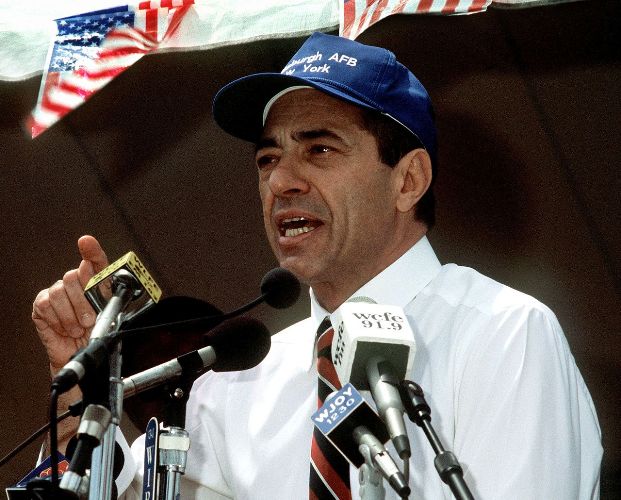Death of a Liberal Icon

Mario Cuomo will be remembered as the liberal lion of the ‘80s and ‘90s. His speech at the Democratic National Convention in 1984, “A Tale of Two Cities,” cemented that legacy. He fought for the common man. Interestingly, he came to prominence in New York fighting for people in Queens and in his losing race to Ed Koch for mayor in 1977 was seen by many as the more conservative candidate. I first met Cuomo and his then teenage son Andrew during that campaign. In my only mention on the front page, above-the-fold in the New York Times, a Sept. 17, 1977 column by Fred Ferretti said, “It was learned that Ms. Abzug’s campaign staff had moved virtually en masse to the Cuomo headquarters on Times Square. Those who moved included Peter Rosenstein, Mrs. Abzug’s Deputy Campaign Manager, now Cuomo’s director of field operations … and other members of the Abzug inner circle Maggie Peyton, Harold Holzer and Kenneth Sunshine.” That happened immediately after Bella lost her primary race for mayor and the run-off was between Cuomo and Koch. It happened before Bella officially endorsed Cuomo and she wasn’t happy.
Then came the dance when she did endorse over who would get to the press conference first, Bella or Mario. The endorsement nearly fell apart over that. Those of us moving to the Cuomo team were to work in two losing elections in quick succession. That was the last time my name ever got mentioned above that of my good friend Harold Holzer, the distinguished Lincoln scholar, who was to become a confidant of Cuomo, or Kenneth Sunshine who was to form a world-renowned public relations firm and is still a confidant of politicians, including current New York City Mayor Bill de Blasio.
Cuomo ran and lost in 1974 for lieutenant governor on a ticket with Howard Samuels. When he lost the mayor’s race, his mother Immaculata Cuomo was widely reported as saying “Mario don’t you ever win nothin?” But he did go on to win and served three terms as governor of New York and twice was the leading Democrat being asked to run for president. Each time he decided at the last minute not to run, which earned him the title “Hamlet on the Hudson.” Cuomo is known for the saying “Politicians campaign in poetry and govern in prose” — something New York’s current mayor is now learning.
Two things remembered from that 1977 campaign are that Cuomo’s stand against the death penalty hurt him and those placards that appeared in the conservative areas of the city saying: “Vote for Cuomo, not the homo” in reference to rumors about Koch’s sexuality. Cuomo denied responsibility for them but it was always apparent someone associated with the campaign was responsible. Cuomo himself moved beyond that and with changing circumstances it was his stand against the death penalty that helped him beat Koch for governor in 1982. His son Andrew is now the governor and it was with his strong support that marriage equality became law in New York State. In politics, nothing stays the same and people change.
It would be very difficult today in most districts across the nation for a politician to stand on the progressive platform that Mario Cuomo enunciated and win. I was reminded in a Facebook post from my friend Joel Lawson of a great quote from a speech Cuomo gave in 1984 at the University of Notre Dame titled “Religious Belief and Public Morality: A Catholic Governor’s Perspective,” in which he said, “I protect my right to be a Catholic by preserving your right to believe as a Jew, a Protestant, or non-believer, or as anything else you choose. We know that the price of seeking to force our beliefs on others is that they might someday force theirs on us. This freedom is the fundamental strength of our unique experiment in government. The values derived from religious belief will not — and should not — be accepted as part of the public morality unless they are shared by the pluralistic community at large, by consensus. That those values happen to be religious values does not deny them acceptability as a part of this consensus. But it does not require their acceptability, either.”
It seems the era in which one could say those things and win is past. Today we have politicians who campaign on having their religious beliefs enshrined in law and who quote the Bible when trying to stop marriage equality. There is a culture of conveniently forgetting how our Founding Fathers fought to ensure the separation of church and state. I would like to think that sooner rather than later our nation will one day advance to a state in which a Mario Cuomo could be elected president.
First printed in the Washington Blade





